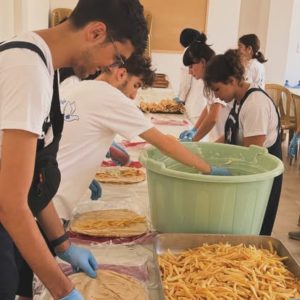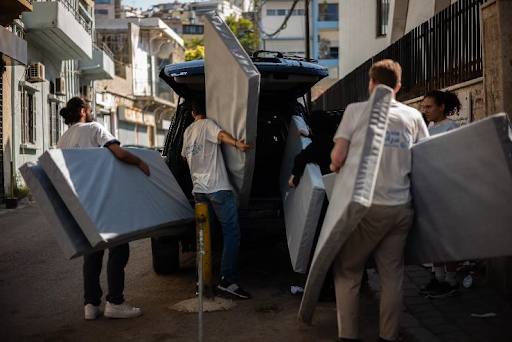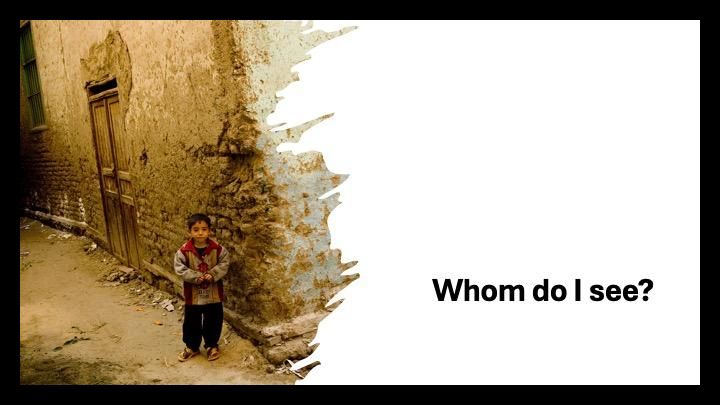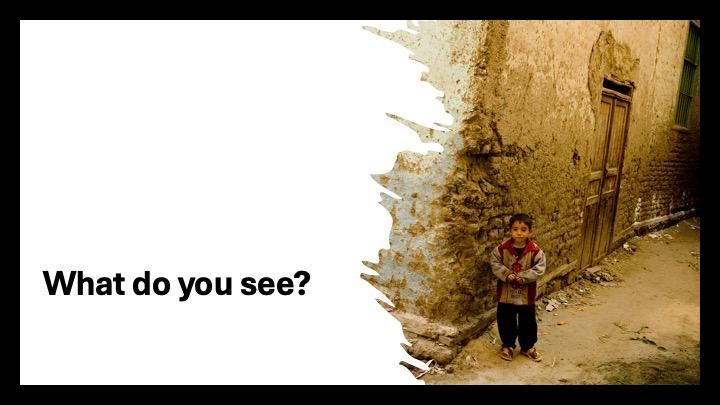David kicked off the University of Oxford presentation with this photo. The doctoral researchers responded: Rural poverty. A crumbling village. A young boy.
We once looked through that lens, too. But we see with new eyes now.
We see through the eyes of two friends, both Lebanese visionaries. Through months of relentless violence, they volunteer as first responders when high-rises collapse into rubble, burying people alive, maiming residents, multiplying widows and orphans.
Many newscasters see victims, or ‘collateral damage.’ Instead, these visionaries see family – their brothers and sisters – adopted as their own flesh and blood.
Their mission? To gather the entire family of Lebanon, a treasure for humanity, by serving with and for the Other.
But how to respond to an overwhelming tsunami of a million civilians fleeing violence?
 They rallied dozens of volunteers to leap into action. Within ten days, volunteers welcomed 900 displaced people into renovated shelters. Ramping up, they soon sustained 1,500 with daily hot meals and drinking water.
They rallied dozens of volunteers to leap into action. Within ten days, volunteers welcomed 900 displaced people into renovated shelters. Ramping up, they soon sustained 1,500 with daily hot meals and drinking water.
Via his streaming cellphone, one visionary took us on a midnight tour through their beehive of activity, introducing us to zealous volunteers. Everywhere, volunteers scurrying: old-timers and newcomers, local and displaced, male and female, of every ethnicity and heritage.
Youths renovating shelters and hauling
mattresses. Aproned teams stacking sandwiches and stirring huge pots. Engineers designing yet more shelters.
Each one helping to gather the entire family of Lebanon together, by serving with and for the Other.
Then I glimpsed a haggard man, hunched over, alone. I could scarcely see him just off camera, but the contrast took my breath away. Joy to grief. Hope to despair. He stepped out of darkness into the light of the reception room.
“Where are you from?” asked the visionary kindly, with us still listening via video feed.
“From the valley beyond the mountains.”
“Are you living out of your car?”
“No, I don’t have a car.”
“Where are you sleeping?”
“On the sidewalk, out in the open.”
“Are you alone?”
“I’m with my wife; my son and daughter, ages eleven and five.”
“How did you hear about us?” the visionary inquired.
“Word of mouth. I know you all because I volunteered with you before.”
“We’re here for you. You have a place with us,” reassured the visionary.
It’s really that simple. Just welcome strangers as friends, and friends as family.
Back at the University of Oxford, David and several doctoral classmates were planning a group presentation. I enthused, “Let’s invite them over for a working lunch!”
During that first lunch at our flat, these new acquaintances politely took small portions and focused on the academic task. But by our third weekly lunch together, a popcorn of ideas bounced around the table while some circled back for seconds.
 That third week, I counted eight pairs of shoes in a tidy row at our front door, respecting my Japanese “socks-indoors” tradition. My heart swelled with joy.
That third week, I counted eight pairs of shoes in a tidy row at our front door, respecting my Japanese “socks-indoors” tradition. My heart swelled with joy.
Why?
A few weeks earlier, David and I had debated at IKEA. Furnish our flat frugally for two? Or set up for four? Or maybe six? Or even as many as eight?
What did we see? Empty chairs and tables, with dangling price tags.
While staring at the visible, we almost missed the reality of the invisible. But then that reality dawned on us! So we stopped asking What? and refocused on Whom?
People, obviously. But can we take action for people we’ve never met? Only by active deeds of stepping into the invisible, with the Dreams InDeed value of Faith.
Hands-on farmer and radical scholar Clarence Jordan put it this way, “Now faith is the turning of dreams into deeds; it is betting your life on the unseen realities.”
We dream of turning strangers into friends, and friends into family. Now is time for deeds. So we bought the largest extension table on offer, with eight empty chairs.
And in just three weeks, every seat was filled.
We’re busy now dishing up vegetarian, halal, you name it. Our new friends hail from Brazil, Chile, China, Congo, India, Morocco, Pakistan, Punjab, Somalia, the UAE, the UK and beyond. And we’re just getting started.
Among new friends at our study group lunch table, David proposed to flip the presentation slide. Can you spot the change?

David confessed his near-sighted eyes once saw a stranger. Or worse, he blindly missed really seeing that boy at all.
Can we now see this boy, our friend? Or better, can we see our brother?
We at Dreams InDeed are committed to see and to act. To see with new eyes. To act with fresh resolve.
Tomorrow, David and I fly to Beirut to stand in solidarity and volunteer with our brothers and sisters, as they adopt hundreds of families displaced by war.
During this holiday season, let’s open our eyes wide to see people clearly, whether next door or across the globe. And then let’s turn their dreams into our deeds.
Welcome strangers. Extend the dinner table. Multiply new friends and family.
Thank you for envisioning with us “a light in every hard place in our generation.“

Janice L Hayashi Haskell
Vice-President of Programme

